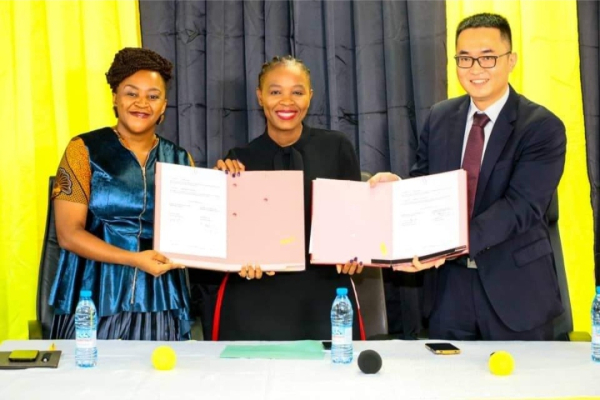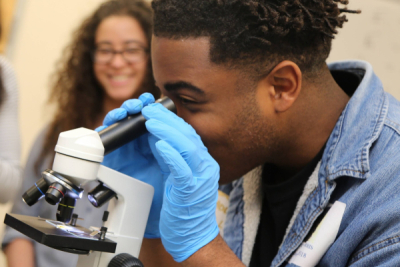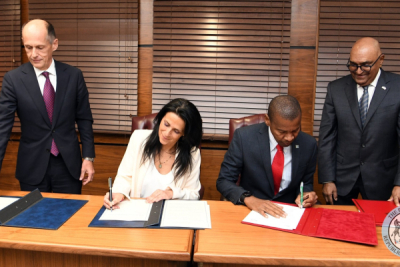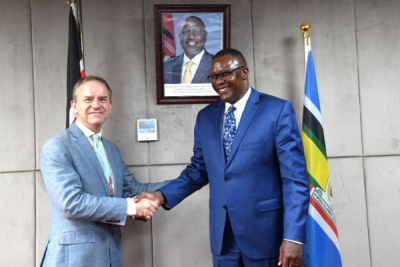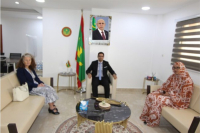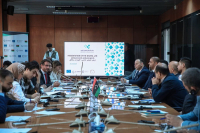
Brief (434)
The International Telecommunication Union (ITU), in collaboration with FNSV Korea, has launched the ITU BSA Application Challenge to revolutionize user authentication in digital financial services. The aim is to leverage blockchain technology to create a highly secure and transparent password-free authentication system. Applications are open until April 30, with the deadline to submit solutions set for August 1, 2024.
On Thursday, April 11, Chinese tech firm Huawei announced a partnership with telecom firm MTN Cameroon. The agreement aims to enhance women’s digital skills. As part of the agreement, participants will attend training workshops on advanced technologies, including 5G, artificial intelligence, cloud computing, and cybersecurity. The objective is to reduce the gender digital gap in the country.
ExxonMobil Foundation, in partnership with Junior Achievement Africa (JA Africa), a subsidiary of JA Worldwide, has recently initiated a non-profit organization aimed at empowering youth: the ExxonMobil STEM Africa initiative. This $300,000 program is designed to foster science, technology, engineering, and mathematics (STEM) education among approximately 3,000 African students across Nigeria, Namibia, Angola, and Mozambique. Further details about the program are available upon request.
On Wednesday 10 April, Botswana's Minister of Foreign Affairs, Lemogang Kwape, and France's Secretary of State for Development and International Partnerships, Chrysoula Zacharopoulou, signed a partnership declaration dubbed the "𝑫𝒆𝒄𝒍𝒂𝒓𝒂𝒕𝒊𝒐𝒏 𝒐𝒇 𝑮𝒂𝒃𝒐𝒓𝒐𝒏𝒆".
The declaration outlines the primary areas of cooperation where Botswana and France aim to bolster their partnership. These areas include digital entrepreneurship, sustainable agriculture, and tourism.
In a post shared on the social network X on Thursday, April 4, the Kenyan Cabinet Secretary for Information, Communications, and the Digital Economy, Eliud Owalo, disclosed a meeting with the United Nations Resident Coordinator in Kenya. The officials discussed the digital transformation program, the empowerment of micro, small, and medium-sized enterprises, and the country’s startups.
The African Union, in collaboration with the German Agency for International Development Cooperation (GIZ) and AfriLabs, a pan-African innovation-centric organization, has launched a fellowship program centered on the digital and innovation. The program seeks to enlist 16 individuals who will be assigned to various departments or organizations within the African Union. Their task will be to pinpoint key sectors that could benefit from enhancements in digitalization, technology, and innovation. Applications are open until April 27.
On April 2, Mauritania’s Minister for Digital Transformation, Innovation, and Modernisation of the Administration, Mohamed Abdallah Ould Louly, met with Leila Peters Yahya, the Resident Coordinator of the United Nations System in Mauritania. The meeting, held in Nouakchott, centered on exploring opportunities to enhance cooperation, particularly in digitization.
Triply, a Kenyan startup that assists travel agencies in payment collection, operation automation, and providing customers with access to financial services, has been included in the Winter 2024 cohort of the California-based accelerator, Y Combinator. The announcement was made on April 1 by the American firm through various communication channels, including social networks and its online platform.
Nigerian fintech firm Thepeer announced its closure in a statement released on April 1. “Our unique service had its challenges, the first being compliance issues [...]. Faced with these challenges, we needed to make a key decision either to do a hard pivot, an M&A, or return capital to investors. After carefully weighing our options, we decided that returning the remaining capital to investors was the best decision,” the start-up explained.
Founded in 2021, Thepeer has raised approximately $2.3 million, according to Crunchbase, to develop its technology and accelerate its growth.
Digital Lab, a Libyan initiative fostering innovation and digital transformation, unveiled an innovation mapping platform in Tripoli on Monday. The platform aims to link innovators, entrepreneurs, researchers, and investors nationwide.
Abdelbaset Albaor, Chairman of the General Information Authority, said the platform “reflects the collaborative efforts of the General Information Authority, Libyan institutions, and [...] international partners.”
“It showcases the major initiatives underway, laying the foundations for a thriving and innovative digital ecosystem to take root in Libya,” he added.
More...
The inaugural Algerian Digital Summit is set to take place from April 23 to 25, 2024, at the Moufdi Zakaria Cultural Center in Algiers. The event, announced on March 20, is born from the consolidation of the Digital African Summit and ICT Maghreb.
Tunisian authorities announced on Monday, March 25, the official adoption of online birth certificates for administrative procedures related to the Ministry of the Interior’s services. This provision extends to Tunisians living abroad, who can now use these online birth certificates for applications or renewals of national identity cards and passports.
On March 20, the Egyptian Space Agency (ESA) and the Chinese Space Administration (CASC) signed a protocol agreement in Cairo for the operation of the EgyptSat-2 satellite. The agreement includes provisions for CASC's support in the peaceful utilization of space and the promotion of sustainable development in Egypt.
On March 21 in Porto-Novo, Louis Vlavonou, the President of Benin's National Assembly, met with Ouanilo Medegan Fagla, the Director General of the Centre national d'investigations numériques (CNIN). Fagla noted the dynamic nature of the National Assembly and the urgent need for digitization. In response to the clear intent of the President of the National Assembly, Fagla expressed CNIN's readiness to support the digital transformation underway at the national assembly, while upholding the principles of digital security integral to this transformation.



